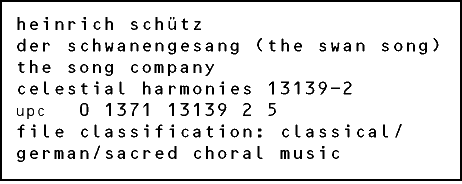 |
|||||||||||||||||||||||||||||||||||||||||||||||||||||||||||||||||||||||||||
 
Australiens Vokalensemble Nr. 1 singt unter seinem künstlerischen Leiter Roland Peelman das Alterswerk des Komponisten, der die Musik im Deutschland des 17. Jahrhunderts radikal verändern sollte. 12 Psalme mit Psalm 100 "Jauchzet dem Herren, alle Welt" als krönendem Abschluss. Doppelchörige Motetten, jede der vier Stimmen solistisch besetzt, lupenrein gesungen, tief bewegend in der für Schütz typischen, gefühlgeladenen harmonischen Entwicklung, erhaben in der kunstvollen Synthese von homophonem und polyphonem Satz, einfach und direkt im tiefmenschlichen Gehalt. Aufgenommen 1996 im großen Konzertsaal des Opernhauses in Sydney, eine der wenigen Produktionen, die die wunderbare Akustik dieses Raumes ohne störende Publikumsgeräusche nutzen; es ist also keine "live"-Aufnahme. the projectDer Schwanengesang is probably the last work
of German composer Heinrich Schütz (1585-1672) who was born exactly
100 years before J.S. Bach. The young Heinrich showed great musical
promise but studied law in Marburg to please his parents. In 1609,
Schütz made the first of three visits to Italy to study with the great
Giovanni Gabrieli—and ultimately to change his life, and along
with it the face of German music by successfully uniting or fusing,
to use contemporary language, the light, decorative Italian style
and the German mysticism. He thus became the Grand Master of German
music in the seventeenth century, the epoch of the young Baroque.
At the end of a full life predonimantly devoted to composing sacred and church music, Schütz composed a testimony of sorts to everything he believed in as a musician—a cycle of motets for eight voices in two antiphonal choirs accompanied by organ basso continuo. His choice of text was equally telling: Psalm 119, the longest psalm in the psalter which, according to Martin Luther is no less than "a small Bible...an elegant handbook within the Bible as a whole". The synthetic nature of this most wondrous of psalms, written acrostically in 22 stanzas of 8 verses must have had a magnetic influence on a composer whose sole artistic aim it was to interpret the word of the Bible in the most truthful way. Out of the 22 stanzas he made 11 motets of 16 verses each ending with the common doxology and each starting with the intonation from the Cantor in order to give it a proper liturgical function. To complete his Swansong, Schütz chose his 1662 setting of Psalm 100, naturally a more overtly exuberant and ceremonial work with continuous contrapunctal activity between the individual voices. The Song Company delivers a very moving summation of Schütz' life's work and conviction. Der Schwanengesang is a revelation of masterful musical skill and quite stunning beauty. the artistsAustralian producer, composer, and highly acclaimed
percussionist Michael Askill
takes credit for producing this superb sacred choral recording performed
by The Song Company. It was recorded in the great concert hall of
the Sydney Opera House in Sydney, Australia, one of the exceedingly
rare recordings made in that famous space without an audience.
The Song Company, under the Artistic Direction of Belgian conductor Roland Peelman, consists of several of Australia's most exciting voices. Established in 1984 by Charles Colman, the ensemble has already earned itself an enviable reputation as Australia's premier vocal ensemble. The ensemble's repertoire covers the whole range of vocal music from twelfth century to the present day including many contemporary compositions by Australian composers. The Song Company performs two parts of the Trilogy The Swan Song—Psalm 119 and Psalm 100—on this recording sung in German, the language in which it was originally written. The members of The Song Company are: Choir One: Nicole Thomson (soprano), Jo Burton (alto), David McKenzie (tenor) and Clive Birch (bass); Choir Two: Ruth Kilpatrick (soprano), David V. Russell (alto), Paul McMahon (tenor), and Andrew Fysh (bass); accompanied by David Drury, organ. discographytracklist
|
|||||||||||||||||||||||||||||||||||||||||||||||||||||||||||||||||||||||||||
|
|
|||||||||||||||||||||||||||||||||||||||||||||||||||||||||||||||||||||||||||
 |



